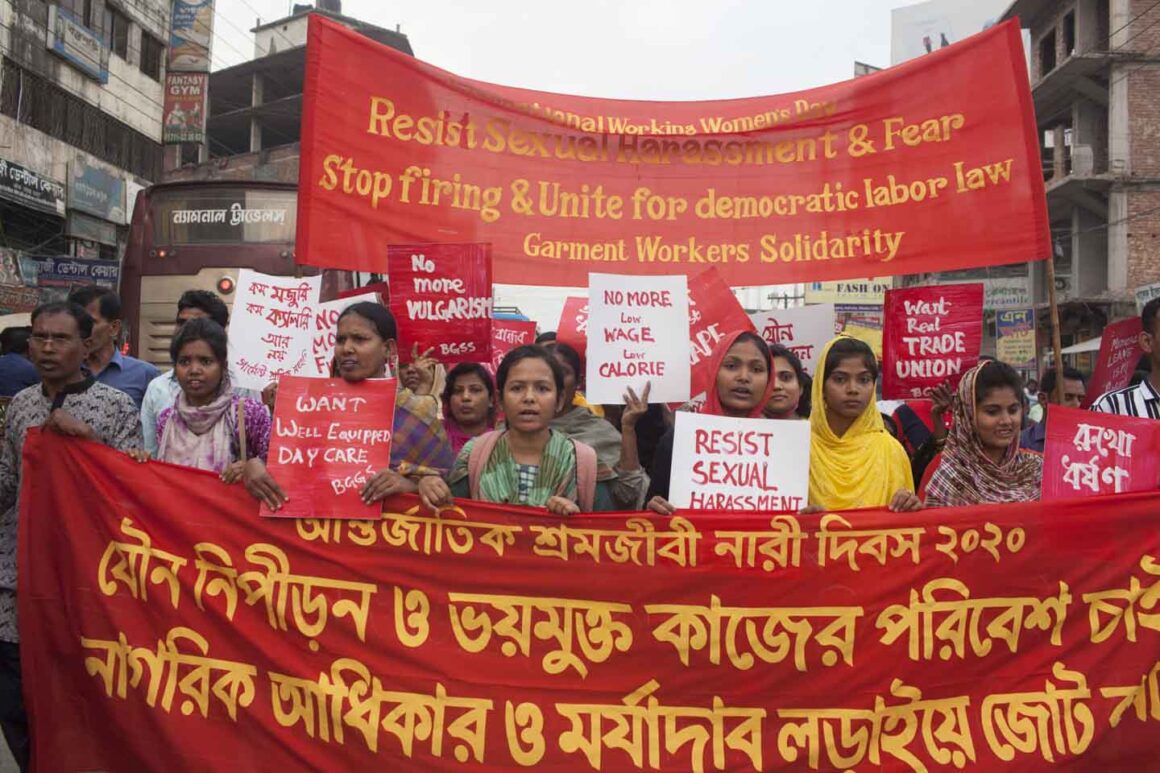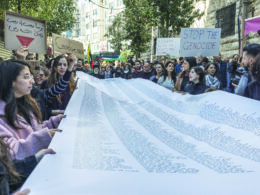By Serge Jordan, International Socialist Alternative
In the past few weeks, Bangladesh has found itself in the throes of one of the most significant labor revolts in a decade. Tens of thousands of primarily women workers from the country’s weighty Ready-Made Garment (RMG) sector, driven to the edge by starvation wages, have engaged in indefinite strike action and taken to the streets in mass demonstrations across Dhaka and the industrial north of the capital, meeting the full brutality of the state in response.
Clothing plays a major role in Bangladesh’s economy. The sector employs around 4.4 million workers and constitutes around 85% of the country’s total exports — making Bangladesh the second-largest RMG exporter globally behind China. In 2013, the Rana Plaza collapse, one of the worst industrial disasters ever in which 1,138 garment workers lost their lives, put a global spotlight on the extremely abusive conditions in the industry, a major link in the production chain of hugely profitable clothing multinationals and retailers.
The crux of the current dispute lies in the demand for higher wages. Bangladesh has the lowest wages for garment workers in the world, and they have not increased since 2018. Yet the inflation rate in the country has reached 9.02%, the highest in 12 years, aggravating the situation faced by workers who are reportedly compelled to resort to stealing and scavenging bins to feed their families. “I despise every moment at the factory because of the harsh conditions and harassment, but with rising inflation the wage I earn is insufficient. Many times, I’ve had to sneak into fields on my way home from work to hunt for vegetables to feed my children. Starvation is next”, reported a striking worker interviewed by The Guardian.
Since October 23, workers have engaged in an indefinite strike, leading to the suspension of operations in hundreds of factories across Dhaka. Thousands have clashed in the streets with the police sent to repress them. In response to the strikes and protests, a government-appointed panel announced a 56.25% increase in the sector’s minimum wage at the end of last month, bringing it from 8,000 to 12,500 taka (from 67 to 105 euros). This was perceived as an insult, especially amid a soaring cost of living crisis; workers’ unions have refused the government’s offer, advocating for a monthly wage of 23,000 taka (192 euros) instead, and protests have intensified since.
Claims from employers that giving the workers more would lead to the sector’s collapse do not stand up to basic scrutiny. Data from the Bangladesh Economic Review of the Finance Division show that from 1994 to the present, the RMG workers’ nominal minimum wage has increased eightfold in taka while over the same period, the sector’s earnings have increased more than 60 times. Workers should demand the opening of the factories’ books to scrutinize the management’s claims and make full disclosure of the real situation.
Showing the political elite’s utter contempt for a workforce whose labor creates about $55 billion in export revenues annually, Prime Minister Sheikh Hasina told protesters to work with the pay rise they already received or to “return to their village”. This is aligned with the general response of the authorities, which has been marked by a severe crackdown on striking workers, with at least four of them already killed by the police. Around 11,000 workers have been fined for participating in protests, thousands face criminal cases related to “vandalism” and “obstructing law and order”, and several union leaders have been arrested.
Fearing for their reputation, 18 global brands, including H&M, Levi’s, GAP, and Puma, have written a joint letter to the Prime Minister, urging “peaceful negotiations” and a new minimum wage covering the basic needs of workers. However, these companies, who have extracted juicy profits from Bangladesh’ sweatshops for many years, are not ready to walk the walk by providing what it costs to make this happen, effectively shifting the blame onto their local subcontractors — who reciprocate this blame game the other way.
Garment workers in Bangladesh have displayed remarkable resilience in the face of the bosses’ intimidation tactics and vicious state repression. They deserve the heartfelt support and solidarity of workers worldwide. Their demand for a monthly minimum wage of 23,000 taka must be upheld, but is only a first step in the struggle needed against the super-exploitative treatment they suffer. All charges against protesting workers must be lifted immediately and all those arrested released unconditionally.
Women workers, who constitute the majority of the workforce, are subject to additional abuse via discriminatory wage practices, endemic sexual harassment, denial of paid maternity leave and more. This wave of strikes underscores the militant role they can play in challenging their oppression and enslavement, and would gain from encompassing demands pertaining to their special needs, so as to enhance their participation in this critical struggle.
The surge of protests by Bangladesh’ garment workers not only unveils the hideous reality behind the seemingly glamorous clothing lines in Western brands’ superstores, manufactured under deplorably low wages and abhorrent working conditions, but also lays bare the role of global capitalism and its local enablers in perpetuating this relentless race to the bottom.
International solidarity with the striking garment workers of Bangladesh! 23,000 taka now! Stop the repression and drop all charges on protesters immediately!












